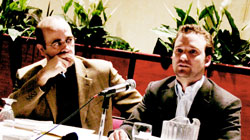Demand more from justice system

School of Community and Public Affairs principal Daniel Salée (left) listens as Alexandre Trudeau discusses the need for courts to be accountable to the public. The media can help make this happen.
Tracey Lindeman
With three men in Kingston Penitentiary nearing the hundredth day of a hunger strike and a year since Adil Charkaoui’s release from custody, Concordia students and members of the community took a hard look at Canada’s national security policies.
As part of Concordia’s School of Community and Public Affairs (SCPA) curriculum, panelists Alexandre Trudeau, Mary Foster, John Thompson and Marcel Danis were invited to discuss the detention of permanent residents and foreign nationals on security certificates. The moderator was SCPA principal Daniel Salée.
The panelists agreed that greater transparency in the judicial process is needed in order to speed up inquiries and provide the defendants with a fair trial. Concordia professor and administrator Marcel Danis, who is also a criminal defense lawyer, deemed Canada’s legal system the best in the world, but lamented its treatment of men detained on security certificates since 9/11.
“The most basic right, citizen or not, should be the presumption of innocence,” Danis said.
John Thompson, president of the MacKenzie Institute, former military intelligence officer and perhaps the most unpopular panelist, agreed that the judicial process for security certificates lacked transparency, but added that sometimes the Canadian government has good reason to stay tight-lipped.
“There are going to be times when these certificates are going to continue to be necessary,” he said, with respect to increasing international terrorism.
Freelance journalist Alexandre Trudeau emphasized that the importance of having the media present at legal proceedings is to ensure that the courts’ decisions are accountable to the public. However, cases involving security certificates are closed to the media, the public, and the defendants. He implored citizens to demand more from Canada’s courts. “The justice system works for the people, not the government.”
Mary Foster, from the Coalition Justice for Adil Charkaoui, was even more skeptical of the country’s legal stance on national security by questioning the validity of suspending defendants’ human rights. “I’m not convinced that security certificates are about national security,” she said, later mentioning racial profiling as a possible motive.
The panel fielded questions from the small but captivated audience, including one about the upcoming revision of the 2002 anti-terrorism law. Thompson explained that compelling testimony, and investing the power in the police to arrest individuals based on the suspicion of forthcoming terrorist action, are measures that will expire.
Having this kind of dialogue in a university only makes sense, SCPA principal Salée said afterwards. The panel discussion series has been part of the SCPA’s curriculum since the program’s inception, and aims to encourage debate on current policy issues. “It gives students a chance to familiarize themselves with various key political issues,” Salée said.
Adam Levy, a second-year SCPA student and co-coordinator of the security certificates panel, said he and colleagues Jens Schaal, Ryan Schwartz, Yasmin Heyat and Zakira Qaderi chose this particular topic because it’s been the subject of much media attention and felt that it complemented Concordia’s history. “People know we talk about relevant issues here,” Levy said.
The third SCPA panel will discuss the birth control pill and its role in controlling women’s cycles on March 6, in time for International Women’s Day. For more information, visit scpa-eapc.concordia.ca.